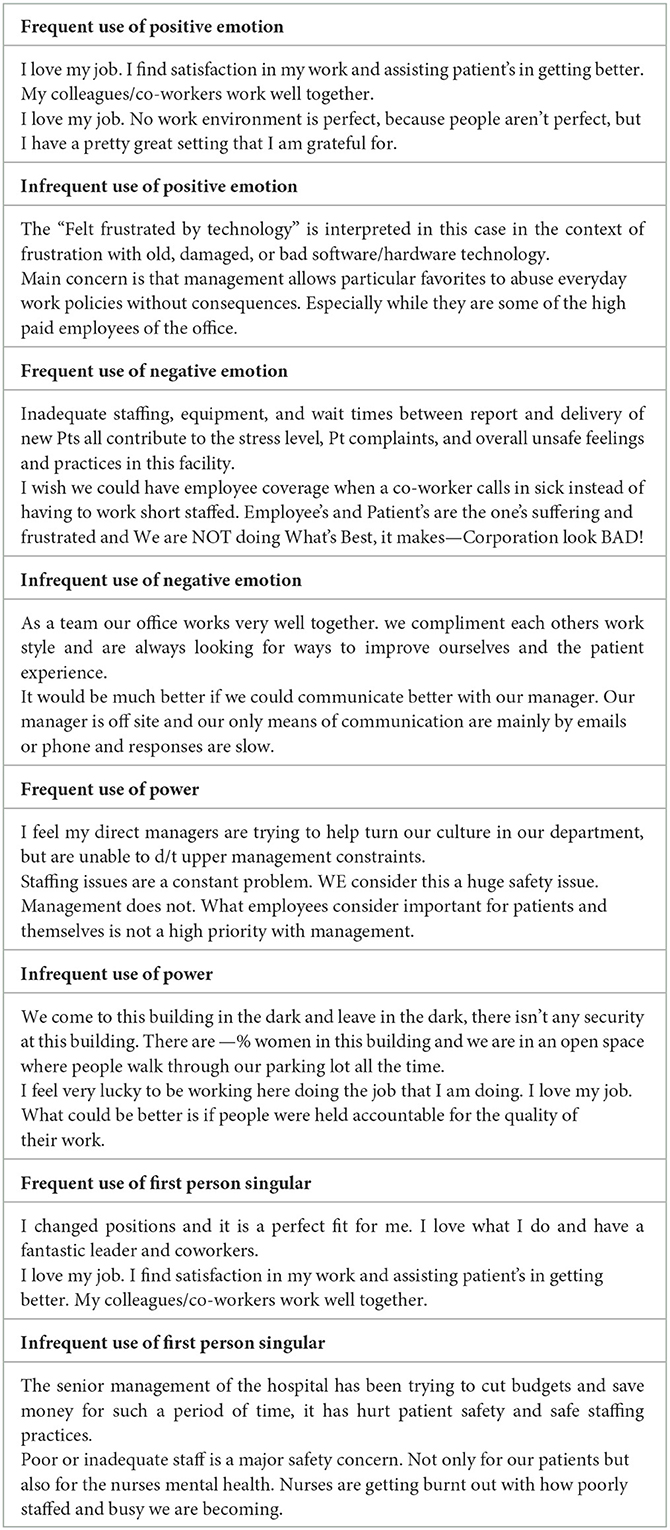- 1Duke School of Medicine, Duke University, Durham, NC, United States
- 2Duke Center for Healthcare Safety and Quality, Duke University Health System, Durham, NC, United States
- 3Safe and Reliable Healthcare, Evergreen, CO, United States
A corrigendum on
The language of healthcare worker emotional exhaustion: a linguistic analysis of longitudinal survey
by Belz, F. F., Adair, K. C., Proulx, J., Frankel, A. S., and Sexton, J. B. (2022). Front. Psychiatry 13:1044378. doi: 10.3389/fpsyt.2022.1044378
In the published article, there was an error in the legend for Figure 2 as published. The labels for Figure 2 are flipped and thus incorrectly communicate key findings from the paper. The corrected legend appears below.

Figure 2. (A) Using linguistic characteristics to predict future EE (2019 comments and 2020 EE). (B) Using emotional exhaustion (EE) to predict future linguistic characteristics (2019 EE and 2020 comments).
In the published article, there was an error in Table 3 as published. “Frequent use of positive emotion” is incorrectly formatted as a title, rather than the table section label it should be. The corrected Table 3 and its caption “Representative comments from the frequent and infrequent use of the linguistic categories” appear below.
The authors apologize for this error and state that this does not change the scientific conclusions of the article in any way. The original article has been updated.
Publisher's note
All claims expressed in this article are solely those of the authors and do not necessarily represent those of their affiliated organizations, or those of the publisher, the editors and the reviewers. Any product that may be evaluated in this article, or claim that may be made by its manufacturer, is not guaranteed or endorsed by the publisher.
Keywords: burnout, emotional exhaustion, stress, well-being, LIWC, linguistic analyses, healthcare worker (HCW), healthcare quality
Citation: Belz FF, Adair KC, Proulx J, Frankel AS and Sexton JB (2023) Corrigendum: The language of healthcare worker emotional exhaustion: a linguistic analysis of longitudinal survey. Front. Psychiatry 14:1243602. doi: 10.3389/fpsyt.2023.1243602
Received: 21 June 2023; Accepted: 25 July 2023;
Published: 03 August 2023.
Edited and reviewed by: Olga Lainidi, University of Leeds, United Kingdom
Copyright © 2023 Belz, Adair, Proulx, Frankel and Sexton. This is an open-access article distributed under the terms of the Creative Commons Attribution License (CC BY). The use, distribution or reproduction in other forums is permitted, provided the original author(s) and the copyright owner(s) are credited and that the original publication in this journal is cited, in accordance with accepted academic practice. No use, distribution or reproduction is permitted which does not comply with these terms.
*Correspondence: J. Bryan Sexton, YnJ5YW4uc2V4dG9uQGR1a2UuZWR1
 Franz F. Belz
Franz F. Belz Kathryn C. Adair
Kathryn C. Adair Joshua Proulx3
Joshua Proulx3 J. Bryan Sexton
J. Bryan Sexton